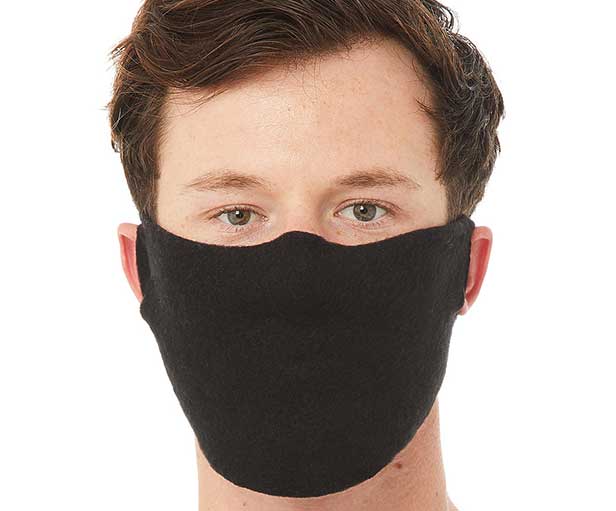News May 08, 2020
Bella + Canvas Exec Cautions Cloth Mask Makers
Chris Blakeslee, Bella’s president, says industry manufacturers should protect themselves by following guidelines in the FDA’s emergency use authorization for face masks.
In a matter of a few weeks, Bella + Canvas (asi/39590) has become one of the largest producers of cloth face masks, and the apparel supplier has been working closely with the U.S. Food and Drug Administration to make sure it’s following the proper guidelines.
“We’re making 100 million masks a week now,” says Chris Blakeslee, president of Bella + Canvas. “Early on, we were very involved with the White House coronavirus task force. At one point, the government was thinking of sending five-packs of face coverings to everyone in the U.S.”

Bella + Canvas is producing around 100 million cloth face masks a week.
As an executive of one of the first promo companies to get into the mask-making business, Blakeslee believes he has a unique perspective to offer guidance to the rest of the industry. He is particularly concerned with the way many in the ad specialty space have been marketing and selling masks.
“The issue is that most of these companies who dove into making face masks have no clue that the FDA has set standards and taken a position on this,” Blakeslee says. “I generally think our industry is pretty good at product safety. [However,] our industry dove into face masks without giving [FDA standards] a thought. I wouldn’t want the industry to end up in a tough spot.”

Back on April 24, the FDA issued an emergency use authorization that face masks, including cloth face coverings, are only authorized for use by the general public and health care personnel as “source control” and are not authorized as personal protective equipment (PPE), nor are they a substitute for filtering face-piece respirators or surgical face masks. In other words, the cloth masks may help to stop people who have COVID-19 (but are asymptomatic) from spreading the virus to others, but they don’t prevent a healthy person from getting the disease.
According to Blakeslee (pictured), the emergency use authorization entails three major areas: labeling requirements, advertising requirements, and reporting and record-keeping requirements.
Product Labeling
There are several requirements that fall under the product labeling category, Blakeslee says. Cloth mask makers must:
• List all materials in the mask that directly touch the skin in their labeling.
• Include instructions for cleaning and/or disinfecting the masks.
• Recommend against using the masks in a clinical setting.
• Not state or imply that the product is intended for antimicrobial or antiviral protection.
“Just by even saying that it’s treated with antimicrobial [properties] is a violation,” Blakeslee says. “That’s a place where people are really opening themselves to potential liability.”
Advertising
When it comes to advertising, it’s really all about ensuring that the companies don’t claim that their masks are FDA approved, Blakeslee says. According to him, advertising and promotional materials should state:
• That the product has not been FDA cleared or approved.
• That it has been authorized by the FDA under the emergency use authorization as source control for the general public.
• That the product is authorized only for the duration of the COVID-19 outbreak and the emergency use authorization.
Providing testing data and making performance claims are also big no-nos, according to Blakeslee. “As a fabric mask manufacturer, you cannot make any performance claims about the mask whatsoever,” he says. “You have to stay completely clear of all of that.”
Reporting and Record-Keeping
The third part of the FDA’s emergency use authorization involves reporting and record-keeping. All mask manufacturers, says Blakeslee, must set up adverse event reporting procedures. That entails:
• Establishing a tracking system and method for customers to post reviews or provide feedback if they, for instance, developed a rash from wearing the mask.
• Maintaining a record of all customer feedback that can be made available upon request.
• Keeping track of all entities that received masks, including date, quantity and location of sale.
The requirements laid out in the FDA’s emergency use authorization are “a lot to digest,” Blakeslee says, adding that they’re also very important, particularly as so much of the promo industry has pivoted to PPE and cloth mask production.
“In a matter of weeks, our industry has probably become the largest PPE distribution network in the world,” Blakeslee says. But, “We’re putting ourselves at risk by being uneducated.”
“We all know how these things go,” he adds. “At some point, someone wearing a face mask is going to get COVID-19, and they’re going to have the perspective that the mask didn’t protect them. If the company who made it didn’t adhere to the guidelines, they’re going to be in trouble.”
